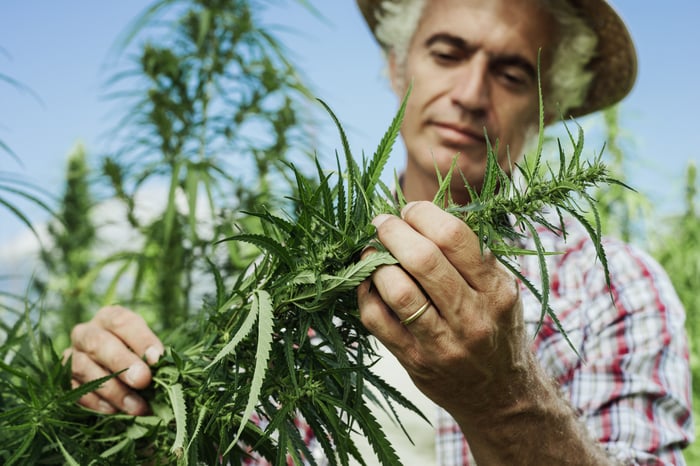Investors are always on the lookout for fast-growing industries, which means it's no surprise marijuana stocks have been such strong performers over the past year. Far more pot stocks than not with a market cap of at least $200 million have doubled or tripled in value over the past year.
Optimistic growth figures for the industry are seemingly everywhere. Aside from the fact that a record number of Americans surveyed by Gallup and CBS News want to see cannabis legalized from both a recreational and medical perspective, the sales growth in the legal-weed industry has been phenomenal. Following 34% growth in legal weed sales in North America last year to $6.9 billion, total sales of recreational and medical marijuana are forecast to expand to $21.6 billion in North America by 2021, according to ArcView Market Research. This sustainable growth has been precisely why investors have latched on to marijuana stocks as possibly the greatest thing since sliced bread.

Image source: Getty Images.
It's the economy, stupid!
But there's much more to the marijuana industry than just headline sales figures – even if these sales figures often steal the show. The marijuana industry is also about jobs growth and both the direct and indirect impact it could have on the U.S. economy.
According to a report issued earlier this year by New Frontier Data, titled "The Cannabis industry Annual Report: 2017 Legal Marijuana Outlook," the cannabis research firm is forecasting that the cannabis industry will have created a whopping 283,422 jobs by 2020. Amazingly enough, this assumes a slowdown in cannabis industry growth over the next couple of years. Nevertheless, New Frontier Data is projecting a compound annual growth rate (CAGR) in medical cannabis sales of 13% through 2025, and a CAGR of 25% for recreational sales over the same timeframe. By 2025, the U.S. recreational-weed industry is expected to be two and a half times the size of the medical-cannabis industry.
Comparatively, according to data from Forbes gathered from the Bureau of Labor Statistics (BLS), by 2024 the BLS expects manufacturing jobs, utility jobs, and government jobs to have declined by 814,000, 47,000, and 383,000, respectively. Imagine that: The marijuana industry offering a far better chance of job growth than the manufacturing industry.

Image source: Getty Images.
Marijuana jobs aren't always "plant-touching"
And what investors need to realize is that these jobs aren't always what we would call "plant-touching," or hands-on with cannabis plants or its byproducts. Yes, there are plenty of jobs being created by growers, processors, distributors, retailers, and delivery services, but there's more to it than that. There are consultants to the industry, marketing strategists designed to boost sales, financial specialists who arrange loans and lines of credit for the pot industry, behind-the-scenes investors, and even suppliers, just to name a few of the jobs that have popped up over the years.
For example, Scotts Miracle-Gro (SMG -0.19%), a company that for more than a century has made its living as a provider of products to make lawns and gardens thrive, has been using its expertise to get involved in hydroponics, which is a method of growing plants while using mineral nutrient solutions in water instead of soil, for the medical-cannabis industry. While Scotts' venture into the marijuana industry through hydroponics, soil, and lighting comprises only around 10% of its revenue, it's nonetheless a rapidly growing division for the company, and thus a major focus while growth in its traditional lawn and garden business slows.
Another good example would be Cree (WOLF 6.87%), which isn't often associated with the marijuana industry but soon might be. Cree is a developer of LED lighting and lighting systems, which are most traditionally used in homes and businesses. However, LED lighting may offer an intriguing alternative to commercial cannabis growers because of longer light lifespan, reduced heat output, and lower long-term costs. The question remains whether growers can get an optimal yield from LED lights compared with the high-pressure sodium lights that are currently used to grow cannabis. If LED light efficiency improves, and upfront costs drop, Cree could indirectly become a major industry player, yielding bigger profits for the company, and perhaps more jobs.

Image source: President Donald J. Trump's official Facebook page. Photo by Benjamin D. Applebaum.
Will Sessions and Trump put the kibosh on legal weed?
Yet in spite of this rapid growth and these bullish predictions from New Frontier Data, the federal government has done nothing more than dig in its heels and refuse to budge on its stance of marijuana as a Schedule I substance.
Last summer, the U.S. Drug Enforcement Agency (DEA) had an opportunity to review two petitions that requested cannabis be rescheduled or de-scheduled entirely. The DEA chose to stand pat and leave the drug's Schedule I categorization in place, given a lack of clinical trial data on weed's safety, benefits, and risks, as well as the potential lack of administration oversight should the drug be rescheduled. The DEA's ruling essentially leaves any hope for change up to Congress.
However, Congress' chance of getting anything done on the marijuana front seems even less likely. Attorney General Jeff Sessions is a noted opponent of pot's expansion. In fact, a note surfaced recently suggesting that he wanted permission to go after medical-cannabis dispensaries, a move that would encroach on states' rights. Meanwhile, President Trump hasn't exactly thrown his support behind recreational cannabis. During a February press briefing, White House press secretary Sean Spicer intimated that the current administration would not be so lax with federal marijuana regulations as the previous administration. That comment leaves the door open for a more restrictive federal stance at some point.
There's no denying that the marijuana industry has plenty of potential for both investors and job-seekers, but the federal government is simply too much of a wild card here. Those involved and investing in the industry have every reason to be a bit worried.





